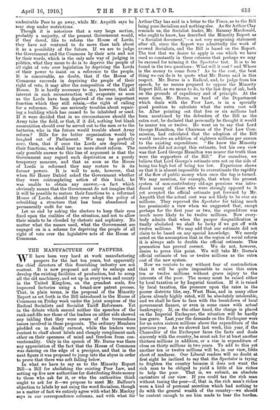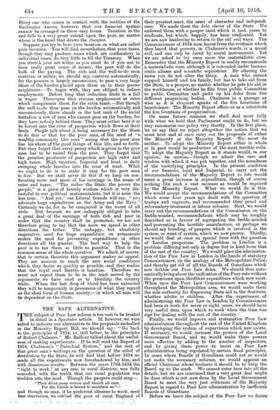Tk1J i MANUFACTURE OF PAUPERS.
WE have been very hard at work manufacturing paupers for the last ten years, but apparently the chief directors of this flourishing industry are not content. It is now proposed not only to enlarge and develop the existing facilities of production, but to scrap all the old machinery, and set up in every town and county in the United Kingdom, on the grandest scale, five improved factories using a brand-new patent process. That, in plain terms, is the proposal of the Minority Report as set forth in the Bill introduced in the House of Commons on Friday week under the joint auspices of the Radical Socialists and Socialist Tariff Reformers. Yet in the debate which ensued neither the speeches of the rank-and-file nor those of the leaders on either side showed any inkling that they were aware of the tremendous issues involved in these proposals. The ordinary Members plodded on in deadly earnest, while the leaders were content to chaff about labels and cheaply compliment each other on their openness of mind and freedom from con- ventionality. Only in the speech of Mr. Burns was there any appreciation of the fact that the House of Commons was dancing on the edge of a precipice, and that in the next figure it was proposed to jump into the abyss in order to prove that there was soft falling below. In what we have to say as to the Minority Report Bill—a Bill for abolishing the existing Poor Law, and setting up five new authorities for distributing State money to those who ask for it, or who the authorities think ought to ask for it—we propose to meet Mr. Balfour's objection to labels by not using the word Socialism, though as a matter of fact we entirely agree with what Mr. Mackay says in our correspondence columns. and with what Sir Arthur Clay has said in a letter to the Times, as to the Bill being pure Socialism and nothing else. As Sir Arthur Clay reminds us, the Socialist leader, Mr. Ramsay Macdonald. who ought to know, has described the Minority Report as " a Socialist document,"—a not very surprising statement after all, since the Report was admittedly the work of avowed Socialists, and the Bill is based on the Report. The test that we desire to apply is one which we have used so constantly in these columns that perhaps we may be excused for terming it the Spectator test. It is to be found in the two questions : What will it cost ? and Where is the money to come from ? As to the cost, the best thing we can do is to quote what Mr. Burns said in this respect. Mr. Burns is a Radical, and, to judge from his speech, by no means prepared to oppose the Minority Report Bill, as we mean to do, to the last drop of ink, both on the grounds of expediency and of principle. At the same time, Mr. Burns, as head of the Department which deals with the Poor Law, is in a specially good position to calculate what the extra cost wilt be. After pointing out that five or six millions had been mentioned by the defenders of the Bill as the extra cost, he declared that personally he thought it would be nearer ten or twelve. He went on to say that Lord George Hamilton, the Chairman of the Poor Law Com- mission, had calculated that the adoption of the Bill would involve an addition of eighteen millions per annum to the existing expenditure. " He knew the Minority members did not accept this estimate, but his own view was that Lord George Hamilton was nearer the truth than were the supporters of the Bill." For ourselves, we believe that Lord George's estimate errs not on the side of being too high but of being too low. Experience shows us that it is almost impossible to overestimate the rapidity of the flow of public money when once the tap is turned. We may mention, for example, that when the present system of non-contributory old-age pensions was intro- duced many of those who were strongly opposed to it yet accepted the official estimate put forward by Mr. Asquith that the actual cost was not likely to be over six millions. They reproved the Spectator for taking much too pessimistic a view when we suggested that, except perhaps for the first year or two, the expenditure was much more likely to be twelve millions. Now every- body admits that when the pauper disqualification is finally abolished we shall be lucky if we get off with twelve millions. We may add that our estimate did not claim to be based on any special knowledge. We merely acted on the assumption that in the region of social reform it is always safe to double the official estimate. This precaution has proved correct. We do not, however, desire to press this point. We will take Mr. Burns's official estimate of ten or twelve millions as the extra cost of the new system.
Now we venture to say without fear of contradiction that it will be quite impossible to raise this extra ten or twelve millions without grave injury to the interests of the poor. The money must be raised either by local taxation or by Imperial taxation. If it is raised by local taxation, the pressure upon the rates in the poorer districts like, say, West Ham, and in many other places already highly rated, will be absolutely intolerable. and we shall be face to face with the breakdown of local government finance, or even in some cases with actual bankruptcy. If, on the other hand, the charge is placed on the Imperial Exchequer, the situation will be hardly less grave. Last year the demands on the Exchequer were for an extra sixteen millions above the expenditure of the previous year. As we showed last week, this year, if the Chancellor of the Exchequer faces the facts and deals sincerely with the country, he must ask for at least another thirteen millions in addition, or a rise in expenditure of close on thirty millions in two years. To add to this yet another ten or twelve millions will be, in our view, little short of madness. Our Liberal readers will no doubt at first sight be inclined to say that the Spectator is trying to frighten the country because it does not want the rich man to be obliged to yield a little of his riches to help the poor. That is, we submit, an absolute caricature of our view. If you could tax the rich man without taxing the poor—if, that is, the rich man's riches were a kind of personal secretion which had nothing to do with the general wealth of the oountry—we should be content enough to see him made to bear the burden. Every one who comes in contact with the realities of the Exchequer knows, however, that our financial system cannot be arranged on these easy terms. Taxation in the end falls to a very great extent upon the poor, no matter whose is the hand that draws the cheques.
Suppose you try to base your taxation on what are called pure luxuries. You will find, nevertheless, that your taxes, though they may produce sums which are confiscatory in individual cases, do very little to fill the Treasury. When you stretch your net wider, as you must do if you are to raise really great sums of money, the poor will do the bulk of the paying. The rich and the well-to-do soon contrive, or rather, we should say, contrive automatically, for the process is largely unconscious, to pass a very large share of the burden placed upon them on to their poorer neighbours.—To begin with, they are obliged to reduce employment. Before long that reduction leads to a fall in wages. Thereupon they resume employment at rates which compensate them for the extra taxes.—But though the well-to-do thus pass on the burden automatically and unconsciously, there stands in the last rank of the social battalion a row of men who cannot pass on the burden, for they have nobody behind them. They must either bear it or be forced into the river of pauperism which flows at their heels. People talk about it being necessary for the State to do this or that for the poor man, of the need of " a wealthy community like ours " seeing that the poor man has his share of the good things of this life, and so forth. But they forget that every penny which is given to the poor man has to be raised from the poor. They forget that the greatest producers of pauperism are high rates and high taxes. High taxation, Imperial and local, is daily sweeping whole families into the river of want. What we ought to do is to make it easy for the poor man to live. But we shall never do this if we keep on con- fiscating more and more of his earnings in the name of rates and taxes. " The richer the State, the poorer the people," is a piece of homely wisdom which is very dis- tasteful to our political sentimentalists, but it is none the less true. " And yet," our Liberal friends will say, " you advocate huge expenditure on the Army and the Navy." Certainly we do, for to be conquered is the worst of all evils. But because we are unhappily obliged to take a great' deal of the earnings of both rich and poor in order that the country shall be protected, we are not therefore going to say that the more we spend in other directions the better. The unhappy, but absolutely imperative, need for huge expenditure on armaments makes the need for preventing expenditure in other directions all the greater. The best way to help the poor is to tax them as little as possible. That is the common-sense of the whole question. We admit, of course, that to certain theorists this argument makes no appeal. They are anxious to reach the new social conditions which they desire as quickly as possible, and they realise that the royal -road thereto is taxation. Therefore we must not expect them to be in the least moved by the arguments we have used as to bleeding the country white. When the last drop of blood has been extracted they will be temporarily in possession of what they regard as the ideal form of human society,—in which all men will be dependent on the State.















































 Previous page
Previous page